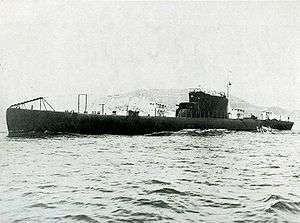Balilla-class submarine
 Italian Submarine Domenico Millelire | |
| Class overview | |
|---|---|
| Name: | Balilla |
| Builders: | OTO |
| Operators: | |
| Succeeded by: | Ettore Fieramosca |
| Subclasses: | Humaytá |
| Completed: | 5 |
| Lost: | 1 |
| Retired: | 4 |
| General characteristics | |
| Type: | Submarine |
| Displacement: |
|
| Length: | 86.5 m (284 ft) |
| Beam: | 7.8 m (26 ft) |
| Draught: | 4.7 m (15 ft) |
| Propulsion: | |
| Speed: |
|
| Range: | 13,000 nmi (24,000 km; 15,000 mi) at 10 knots (19 km/h) |
| Test depth: | 400 ft (120 m) |
| Complement: | 77 |
| Armament: |
|
The Balilla-class were the first submarines to be built for the Italian navy following the end of World War I. They were large ocean-going cruiser submarines designed to operate in the Indian Ocean based in Italy's East African colonies. The design was double-hulled and based on the German Type UE 2 U-boats, one of which, U-120 was supplied to the Italians as a war reparation. A 425 horsepower (317 kW) auxiliary diesel engine was installed as an extra generator.
During the war, the boats were stationed in the Mediterranean in 1940 but proved too large to be effective patrol submarines. Their only success was the sinking of the British submarine HMS Triad by Enrico Toti on 15 October 1940. After 1941 they were used as transport submarines to supply Italian forces in North Africa. The surviving boats were scrapped after the war.
One submarine, Humaytá, was built for the Brazilian navy to a modified design.
Design
The design of the Ballila-class consisted of a strong double-hull which gave the ships a maximum diving depth of 350 ft (110 m), though Domenico Millelire reached 400 ft (120 m) in trials. The boats displaced 1,427 tons surfaced and 1874 tons submerged. They were 86.5 m (284 ft) long with a beam of 7.8 m (26 ft) and a draught of 4.7 m (15 ft). The boats were considered to have poor stability.[1]
Propulsion
The submarines were powered by 2 Fiat diesels for surface cruising and 2 Savigliano electric motors for use while submerged driving 2 shafts. These created 4,900 bhp (3,700 kW) and 2,200 hp (1,600 kW) respectively. The second diesel engine was for auxiliary purposes and for recharging the batteries, novel at the time of the boats' construction. This gave the ships a speed of 16 knots (30 km/h; 18 mph) surfaced and 7 knots (13 km/h; 8.1 mph) submerged. However the initial design called for the ability to reach speeds of 17.5 knots (32.4 km/h; 20.1 mph) surfaced and 8.9 knots (16.5 km/h; 10.2 mph) and the subs never reached these marks. The Ballila-class boats had a range of 13,000 nmi (24,000 km; 15,000 mi) at 10 knots (19 km/h).[1]
Armament
The Ballila-class was armed with 6 533 mm (21.0 in) torpedo tubes with 4 located in the bow and 2 in the stern. The submarines carried a load of 16 torpedoes, with two reloads for each bow tube and one reload for each stern tube.[1]
The class was also armed with 1 1924 model 120 mm (4.7 in)/27 calibre deck gun that was placed in a shielded mounting in the forward section of the conning tower. In 1934, the class underwent a refit that upgraded the model to a 120 mm (4.7 in)/45 calibre gun. The ships also received 2 13.2 mm (0.52 in) machine guns placed two single mounts.[1][2]
Humaytá sub-class
Humaytá was ordered by the Brazilian navy as a deep-diving submarine. Modifications to the standard Ballila design include the placement of the diesel and electric motors further forward, the elimination of the bow planes and a different distribution of the ballast tanks throughout the submarine. The submarine was longer at 87 m (285 ft) with a shallower draught, 4 m (13 ft). The vessel displaced 1390 tons surfaced and 1884 tons submerged.[3]
The submarine was powered by 2 Ansaldo diesels with one electric motor creating 4,900 bhp (3,700 kW) and 900 hp (670 kW) respectively. This gave the ship a speed of 18.5 knots (34.3 km/h; 21.3 mph) surfaced and 9.5 knots (17.6 km/h; 10.9 mph) submerged.[3]
Humaytá differed in armament too. The submarine was equipped with the 6 533 mm (21.0 in) torpedo tubes with 4 located in the bow and 2 in the stern. However, the vessel had only a 4 in (100 mm) deck gun and carried 16 mines.[3]
Ships
All ships were built by OTO in Muggiano. Humaytá was a modified version of this design built for the Brazilian navy in 1927. The ship was retired in 1950.
| Ship | Namesake | Launched | Fate |
|---|---|---|---|
| Italy | |||
| Balilla | Giovan Battista Perasso | 20 February 1927 | Transformed in barge and broken up in 1946 |
| Domenico Millelire | Domenico Millelire | 19 September 1927 | Turned into latex depot and used by Pirelli until 1977 |
| Antonio Sciesa | Amatore Sciesa | 12 August 1928 | Damaged September 1942 at Benghazi, scuttled 12 November 1942 |
| Enrico Toti | Enrico Toti | 14 April 1928 | Used as pontoon and broken up in 1946 |
| Brazil | |||
| Humaytá | 11 June 1927 | Scrapped | |
See also
Notes
References
- Chesneau, Roger, ed. (1980). Conway's All the World's Fighting Ships 1922–1946. Greenwich, UK: Conway Maritime Press. ISBN 0-85177-146-7.
- "Balilla Class". Battleships-cruisers.co.uk. Retrieved 11 December 2014.